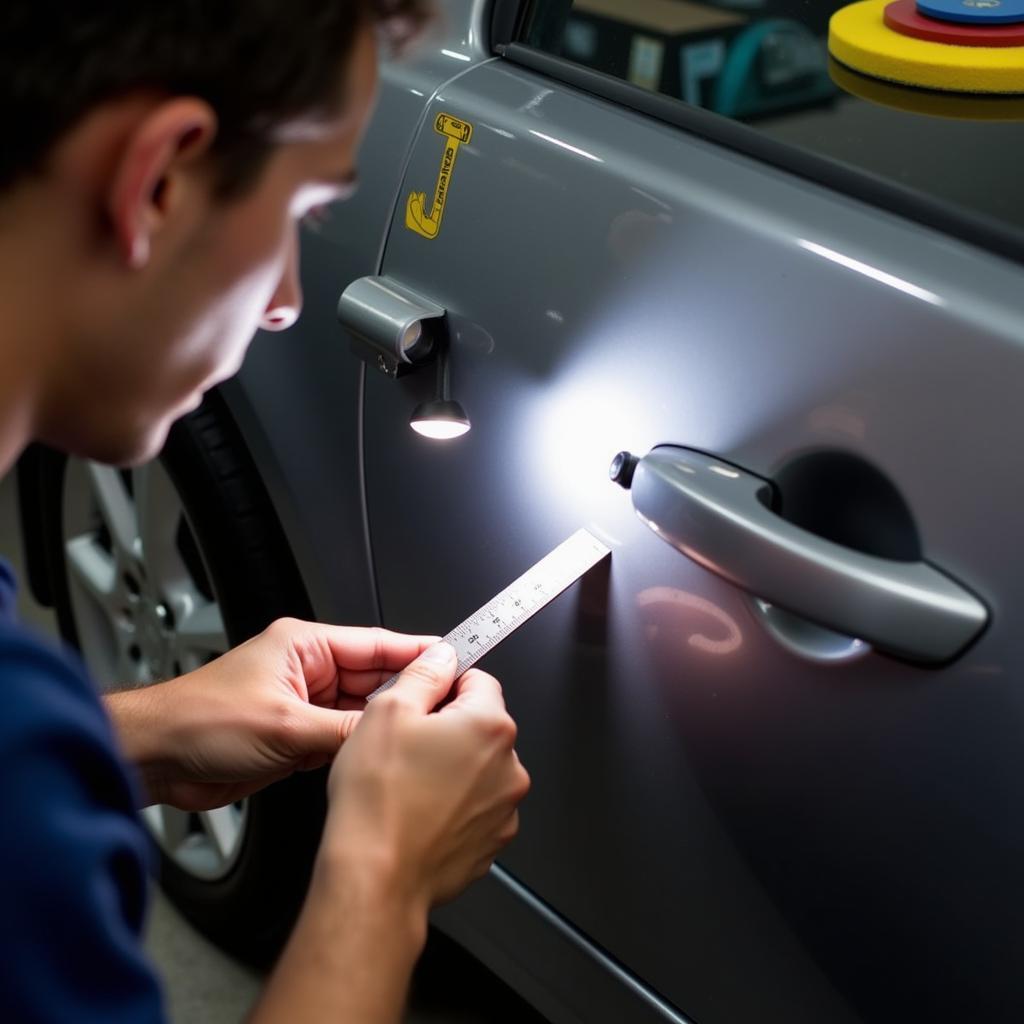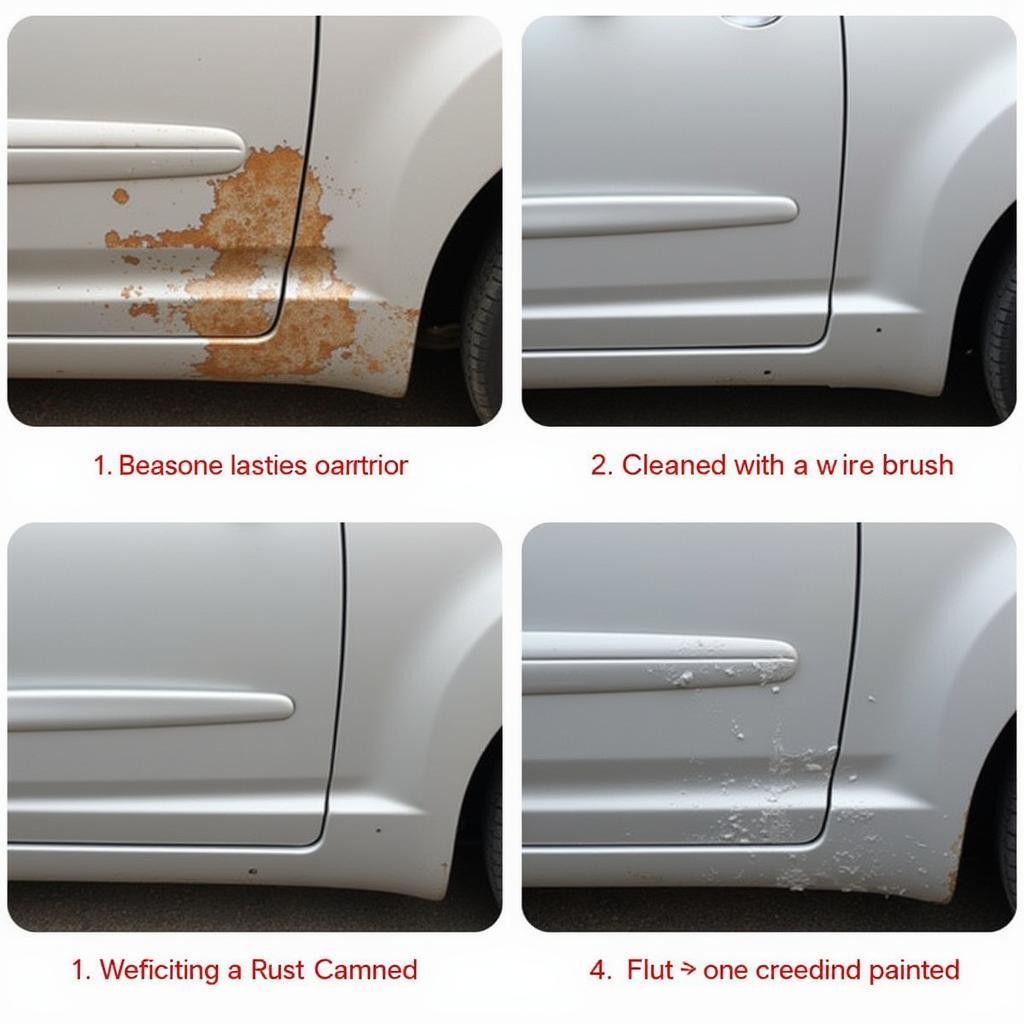
Assessing car damage for DIY repair
Car Bodywork Repairs At Home can be a cost-effective way to address minor damage and improve your car’s appearance. This guide provides valuable insights and practical tips to help you achieve professional-looking results, from assessing the damage to choosing the right tools and techniques.
Understanding the Scope of DIY Car Bodywork Repairs
Before diving in, it’s essential to determine if a DIY repair is feasible. Minor scratches, dents, and scuffs are often manageable at home. However, significant damage involving structural components or safety features requires professional intervention. Knowing your limits is crucial for both your safety and the longevity of your car.
Assessing the Damage: When DIY is Appropriate
 Assessing car damage for DIY repair
Assessing car damage for DIY repair
Start by thoroughly cleaning the damaged area to get a clear picture of the extent of the damage. Surface scratches may only require polishing, while deeper scratches might need filler and repainting. Dents can sometimes be pulled out using specialized tools. Remember, attempting complex repairs without proper training and equipment can lead to more harm than good.
Gathering the Necessary Tools and Materials
Having the right tools is crucial for successful car bodywork repairs. Basic tools include sandpaper, body filler, a putty knife, masking tape, and paint. More specialized tools like dent pullers and polishing machines can be helpful depending on the repair. Investing in quality materials ensures a better finish and longer-lasting results. Consider visiting your local auto parts store for car body repair glasgow or car bodywork repairs glasgow.
Step-by-Step Guide to Common Car Bodywork Repairs
This section provides practical guidance on tackling common car bodywork issues at home. Remember to always prioritize safety and wear appropriate protective gear.
Repairing Minor Scratches
For light scratches that haven’t penetrated the paint, polishing compound and a microfiber cloth can often restore the shine. Deeper scratches require sanding, priming, and repainting the affected area. Precision and patience are key to achieving a seamless finish.
Fixing Small Dents
Small dents can sometimes be repaired using DIY dent removal kits. These kits typically involve suction cups or glue pullers to gently pull the dent back into place. For more stubborn dents, you might need to access the backside of the panel and gently push the dent out. However, for larger or more complex dents, seeking professional car body repairs swinton is recommended.
Addressing Rust Spots
Rust can quickly spread and compromise the structural integrity of your car. Addressing rust promptly is essential. This involves removing the rust using a wire brush or sandpaper, treating the area with a rust converter, and then priming and repainting. Remember that preventing rust is crucial. Regular washing and waxing can protect your car’s paintwork and prevent rust formation.
 Repairing rust spots on car bodywork
Repairing rust spots on car bodywork
Expert Insights on Car Bodywork Repairs
“Preventing minor damage through regular maintenance and careful driving can save you a lot of time and money in the long run,” says John Miller, a veteran automotive technician with over 20 years of experience. “However, when damage does occur, knowing what you can handle yourself and when to call a professional is crucial.”
“Investing in quality tools and materials makes a significant difference in the outcome of your DIY car bodywork repairs,” adds Sarah Johnson, a certified auto body repair specialist. “Don’t skimp on essentials like sandpaper, body filler, and paint. It’s worth the investment for a professional-looking finish.”
Conclusion
Car bodywork repairs at home can be a rewarding experience for minor damage. By following these guidelines and knowing your limitations, you can improve your car’s appearance and save money. Remember to prioritize safety and seek professional help for complex repairs. If you are looking for professional car bodywork repairs in the Glasgow or Swinton areas, consider visiting car body repair glasgow swinton or car body repairs swinton manchester.
FAQ
- Can I repair deep scratches at home? Yes, but it requires more advanced techniques like sanding, priming, and painting.
- What type of paint should I use for car bodywork repairs? Automotive paint specifically designed for your car’s make and model is recommended.
- How can I prevent rust on my car? Regular washing, waxing, and addressing any chips or scratches promptly can help prevent rust.
- Is it necessary to prime before painting? Yes, primer provides a better surface for the paint to adhere to and ensures a more durable and even finish.
- What are the best tools for removing small dents? Dent removal kits with suction cups or glue pullers are often effective.
- How do I match the paint color to my car? Your car’s paint code can be found on a sticker inside the driver’s side doorjamb or in your owner’s manual.
- When should I seek professional help for car bodywork repairs? For significant damage involving structural components or safety features, consult a professional.
Need assistance with your car bodywork repairs? Contact us via WhatsApp: +1(641)206-8880 or Email: [email protected]. Our customer service team is available 24/7.

